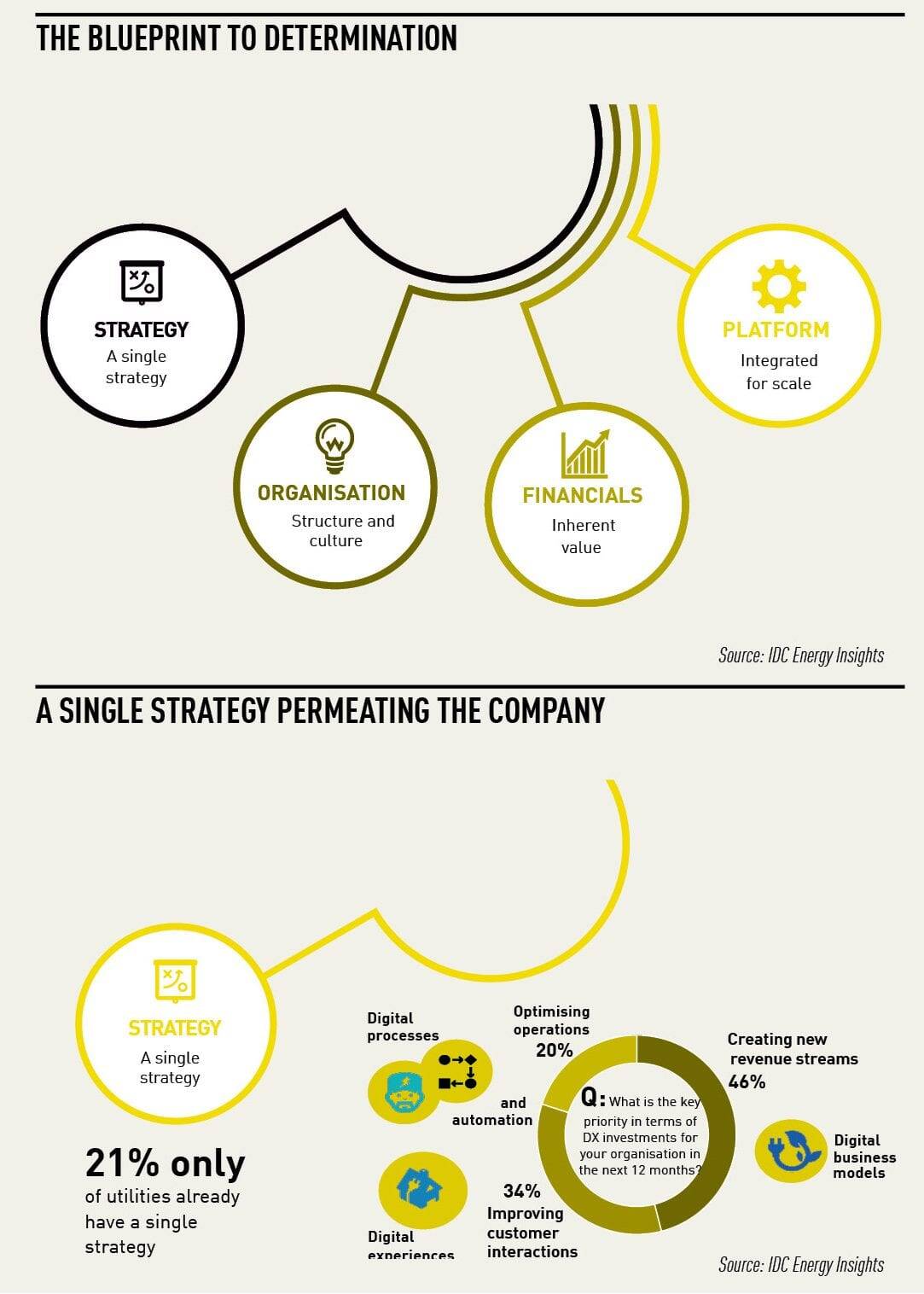This is the Sponsored paywall logged out
Many utilities are struggling to achieve meaningful change on the back of digital transformation programmes. It’s high time for a more strategic and structured approach.
Utilities have been trudging through the mire of digital transformation for years now. Yet all too often they have little to show for their labour and investments, according to insights presented at a private event hosted by Utility Week in association with Tata Consultancy Services (TCS), last month.

Well over a decade has passed since the term “big data” rose to prominence, switching quick-thinking business leaders across sectors on to the fact that the wealth of data emanating from a breakneck escalation of connectivity across assets and consumer devices would drive radical change in organisational architectures, operations and business models.
It’s safe to say that utilities were not prominent among this first wave of digital transformation pioneers. And while most have long since woken up to the fact that data and digital capability will define their futures, relatively few have really grasped how to execute the shift to data-driven operations, or so research outfit IDC Energy Inisghts found when it conducted a Europe-wide study of digital transformation maturity among utilites on the behalf of TCS. A selection of these findings are represented in the graphs, right.
According to IDC Energy Insights, the significant majority of European utilities have been unable to progress beyond initiative-based digital innovation projects and short-term data leverage. The trend holds true in the UK, where the study found that almost 60 per cent of utilites are stuck in a hinterland of the “digitally distraught”.
Speaking at Utility Week’s event, Roberta Bigliani, vice president IDC Energy Insights, sparked spirited debate by sharing some of the reasons for this stunted digital progress with a select group of business and technology leaders from a range of UK utility players.
Top of the list for the limited success of most digital transformation endeavours was lack of integration with the broader strategic objectives of the organisation. Just one in five UK utilities can say their digital strategy is embedded within business strategy, Bigliani said.
Beyond this a shortage of appropriate expertise, weak road maps for change, islanded approaches to digital innovation and outdated KPIs (key performance indicators) for success were found to be to blame for holding utilities back.
Degrees of success
IDC’s research messages resonated with the group – comprising representatives from major energy suppliers, monopoly networks and code governance bodies. While the majority of those present claimed their organisations had achieved integration of business and digital strategies, many comments showed that this has not resolved uncertainty around ultimate ownership for digital transformation success.
One guest representing a UK power generation and retail giant suggested that systems thinking and design thinking must define organisational approaches to digital transformation in order to gain true visibility of its impact across different business pillars and clarify collective responsibility for its success. More broadly, it was felt that “business” leaders should primarily be accountable for the success of digital change programmes, rather than technology or data job titles. Those attendees with long experience in leading digital change programmes also urged peers to ensure that distinct budgets are made available. “Do NOT try to fund digital transformation out of business as usual,” one guest emphasised.

Strategic approaches
Discussion of strategic approaches to digital transformation soon turned to consideration of key technologies, data cleaning and governance challenges and team structures to underpin sustainable adoption of digitally driven ways of working. Amid this debate, some key thoughts around the significance of cloud computing and software as service models for utilites were shared, highlighting a step change in industry thinking about these hosting options – especially among critical infrastructure owners – compared to three years ago, when a group of technology leaders at another Utility Week roundtable told this magazine that cloud solutions would never be suitable for core IT systems.
This was welcome news to Bigliani, who expressed frustration with those utilites which still questioned the ability of cloud platforms to provide suitable security and reliability for critical infrastructure systems. “Have you tested you on-premises system security lately,” she laughed, before pointing out that Italian power infrastructure giant Enel has now adopted a “cloud only” policy when considering its technology choices.
Coming full circle to consider execution of successful digital transformation, participants asked if commonly understood drivers for digital transformation – such as the proliferation of data, decentralising systems and the need for new business models to refresh and re-imagine relationships with customers – are widely understood in terms of what they require of execution strategies.
It’s a question IDC has explored and offered an answer to. Approaches to execution of digital transformation programmes must be considered in a framework of the “3Rs” said Bigliani. These are relevance, risk and resilience.
A transformation and technology adoption journey that is guided by these principles multiplies its chances of achieving scale and success, she concluded.
Outside-in
In addition to the research presentation from IDC Energy Insights, guests at the roundtable enjoyed insights into the digital transformation experiences of two leaders from outside the utilities sector.
Darren Webber, head of testing and quality centre of excellence at Royal Bank of Scotland, and Tom Wasilewski, head of commercial development at Post Office, both joined the event to highlight their top lessons learned from their varied careers in digital change leadership.
Some of these included:
- Don’t underestimate the value of expert project management for digital transformation programmes.
- Empower change agents to maximise your chances of embedding transformation. Agents should be representative of different workforce demographics.
- Don’t shy away from sharing bad news about programme progress with senior management. It’s important that senior management is aware when projects need to track correct and why.
- Use agile development methodologies to support flexibility within transformation programmes and create a positive energy within multi-disciplined teams.

Opinion Krishna Kanth
Head of utilities industries unit
(UK and Ireland)
Utilities need to be agile to adapt to a world of constant disruption.
Gone are the days of mere disruption – we are now witnessing the age of “disruption at pace”, and the age of “innovation at pace”. Necessity, that metaphorical mother, is driving the innovation needed to address changes in customer behaviour; increasing customer demands and expectations; constant changes in market conditions; the nimbleness of new entrants; and the acceleration in technological advancements.
As companies refashion their interactions with customers, fewer people listen patiently to recorded assurances that “your call is important to us”. Customer experiences with Amazon or Uber are the new standard and customers now compare the experiences provided by all companies on the same scale. This, combined with the eruption of the “smart” world (devices, meters, grid, vehicles, etc), the affinity towards greener and low carbon energy and the increased drive to save resources, have all contributed to a constant change in both regulations and expectations on utilities.
To adapt to this constant need to innovate and change, utilities are overwhelmingly turning towards “agile” as their preferred delivery model. This is where established organisations face one of their biggest challenges – “how do you transform your established internal processes and the established working culture in a way that it is constructively disruptive to the organisation”.
From a technology perspective, it is no wonder that cloud is the foremost investment priority for European utilities. It facilitates the agility needed to adapt to the changing world. It allows scaling at pace and enables companies to leverage vendor ecosystems without breaking the bank.
While cloud provides the legs to race, data is the necessary spine, AI is the new brain and mobility, the face for the organisations. These together make up the lion’s share of the investments being made, and rightly so.
Here are the facts: 4 per cent of European utilities have embraced agile methodologies, 57 per cent are investing primarily in cloud, 53 per cent in mobility and 48 per cent in cognitive technologies. But have they all been successful in achieving their business goals? Technology and frameworks are mere tools and how they are used will differentiate the leaders of tomorrow.

Opinion Kripa Subramanian
Global lead customer experience, TCS
‘Welcome to the digital world of hyper-personalisation’
The digital economy and digital society are, apart from being unstoppable, a force for good. They will drive convenience and hyper-personalisation in its simplest form. As companies discover the true value of the data they hold, they must digitally twin this precious resource with processes in order to change the nature of customer interactions. This will trigger a swift shift from reactive interactions to proactive, predictive, controlled state relationships.
By virtue of this change, customers will redefine their expectations of interaction with their energy providers. Utility companies need to move now or let change pass them by, making themselves redundant. The three points below will define their readiness for this change:
- Adoption of cloud and digital infrastructure towards a connected enterprise coupled with an understanding that there will be no end date to the change. Continuous technology changes will become the new normal.
- The ability to shake the cultural mindset within the company, where every employee gets involved and by virtue of that,
re-skilled. - Redefining operating models by dissolving barriers between data, talent and teams and realise that no-one can own customer experience.


Please login or Register to leave a comment.